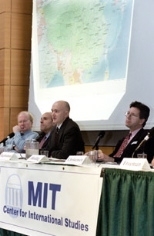Relations between the United States and China do not necessarily point to impending conflict, but the triangular tensions among the US, China and Taiwan show troubling stretch marks, two panels of experts said during a public discussion held on Feb. 8 in Wong Auditorium.
The event, titled "The US and China: A Coming Conflict?" was sponsored by the MIT Center for International Studies (CIS) with support from the MIT International Science and Technology program (MISTI).
Six panelists participated. They were Thomas J. Christensen, associate professor of political science; Harvey Feldman, Senior Fellow for Asia for the Heritage Foundation; Chas W. Freeman Jr., chairman of Projects International and co-chair of the US-China Policy Council; Harry Harding, dean of the Elliott School of International Affairs at George Washington University; Eric Heginbotham, a doctoral candidate in political science; and Edward S. Steinfeld, associate professor of political science.
Stephen W. Van Evera, associate professor of political science, served as moderator for the two panels and introduced the speakers and discussion topics. A specialist in international affairs and security studies, Van Evera focuses on nationalism, military policy and the causes of war.
The general goal of the CIS event was to explore "two large questions: the rise of China and the problem of managing that rise," said Van Evera. "Will a US-China Cold War unfold? What should we do about the Taiwan Straits conflict?"
Addressing the first panel, which focused on bilateral relations between the United States and China, Van Evera asked, "Will China's economy rival the US economy? What military power can China distill [from its economy]? What will be a risen China's foreign policy goals? What about military expansion and how the US should respond? Can the US retard Chinese economic growth with Cold War-style trade containment?"
Responding to a request from the audience, Feldman addressed issues that inhibit US-China friendliness, citing the "proliferation of weapons technology and of selling that technology to Iran, Iraq and Pakistan. We also have issues with serious human rights problems," he said.
Freeman and Feldman, both former ambassadors, argued for a nuanced perspective in foreign relations. "The zero-sum game is not the way things work. It's a very, very false dichotomy," said Feldman.
Freeman declared that common interests shared by the US and China outweigh the likelihood of a disruption in the balance of power, though "Taiwan is an issue of national honor for both," he said.
Freeman also provided a swift if somewhat tongue-in-cheek tour of recent US-China relations. "In the post-Cold War, the USA suffered from enemy deprivation syndrome, with symptoms of disorientation. Between 1989 and Sept. 11, 2001, a frivolous era set in. We flung our pet rock, so to speak. Foreign policy was something we did to foreigners. China was a target, based on the Russian threat model of a rising power. We'd been used to being number one. Now what? Plus, there was that annoying, intolerable propensity of Chinese not to be Americans," he said.
Several panelists noted the distance between the Chinese Communist Party and the Chinese people especially on economic issues. Christensen even joked, "If you want to meet a Communist, come to Cambridge, Massachusetts."
The second CIS panel focused on assessing the risk of war between Taiwan and China, on possible scenarios of that war, and on how the US might dampen or, if necessary, respond to such a war.
A version of this article appeared in MIT Tech Talk on March 6, 2002.






